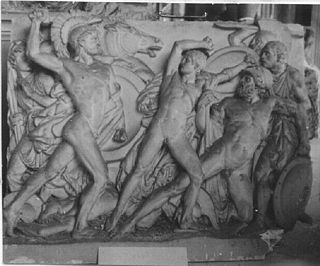 W
WMettius Fufetius was a dictator of Alba Longa, an ancient town in central Italy near Rome. He was appointed after the death of king Gaius Cluilius. When a full-blown war threatened to erupt between the Alba Longans and the Romans, Fufetius proposed to the third legendary King of Rome, Tullus Hostilius, a smaller 3 vs. 3 battle. Having lost this, the Albans submitted themselves to Roman rule. Disappointed in the outcome, Fufetius later schemed with an Etruscan rival, but was defeated by Rome.
 W
WIn Roman mythology, Mezentius was an Etruscan king, and father of Lausus. Sent into exile because of his cruelty, he moved to Latium. He reveled in bloodshed and was overwhelmingly savage on the battlefield, but more significantly to a Roman audience he was a contemptor divum, a "despiser of the gods."
 W
WLars Porsena was an Etruscan king known for his war against the city of Rome. He ruled over the city of Clusium. There are no established dates for his rule, but Roman sources often place the war at around 508 BC.
 W
WLucius Tarquinius Priscus, or Tarquin the Elder, was the legendary fifth king of Rome and first of its Etruscan dynasty. He reigned from 616 to 579 BC. Tarquinius expanded Roman power through military conquest and grand architectural constructions. His wife was the prophet Tanaquil.
 W
WLucius Tarquinius Superbus was the legendary seventh and final king of Rome, reigning from 535 BC until the popular uprising in 509 BC that led to the establishment of the Roman Republic. He is commonly known as Tarquin the Proud, from his cognomen Superbus.
 W
WLars Tolumnius was the most famous king of the wealthy Etruscan city-state of Veii, roughly ten miles northwest of Rome, best remembered for instigating a war with Rome that ended in a decisive Roman victory.
 W
WServius Tullius was the legendary sixth king of Rome, and the second of its Etruscan dynasty. He reigned from 578 to 535 BC. Roman and Greek sources describe his servile origins and later marriage to a daughter of Lucius Tarquinius Priscus, Rome's first Etruscan king, who was assassinated in 579 BC. The constitutional basis for his accession is unclear; he is variously described as the first Roman king to accede without election by the Senate, having gained the throne by popular and royal support; and as the first to be elected by the Senate alone, with support of the reigning queen but without recourse to a popular vote.